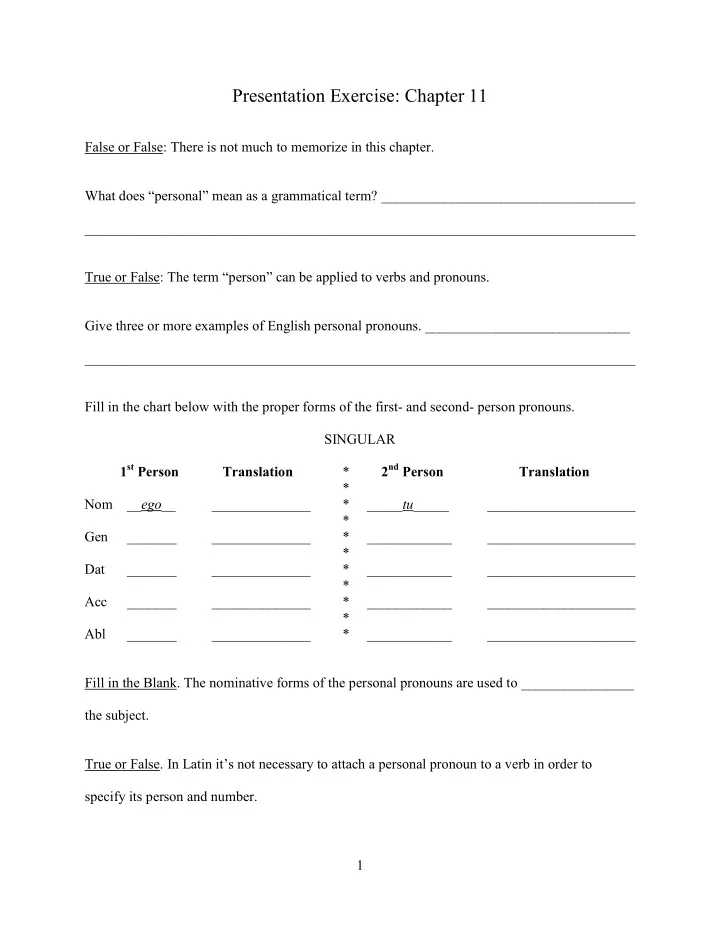

Presentation Exercise: Chapter 11 False or False: There is not much to memorize in this chapter. What does “personal” mean as a grammatical term? ____________________________________ ______________________________________________________________________________ True or False: The term “person” can be applied to verbs and pronouns. Give three or more examples of English personal pronouns. _____________________________ ______________________________________________________________________________ Fill in the chart below with the proper forms of the first- and second- person pronouns. SINGULAR 1 st Person * 2 nd Person Translation Translation * Nom __ ego __ ______________ * _____ tu _____ _____________________ * Gen _______ ______________ * ____________ _____________________ * Dat _______ ______________ * ____________ _____________________ * Acc _______ ______________ * ____________ _____________________ * Abl _______ ______________ * ____________ _____________________ Fill in the Blank. The nominative forms of the personal pronouns are used to ________________ the subject. True or False . In Latin it’s not necessary to attach a personal pronoun to a verb in order to specify its person and number. 1
***************************************************************************** Linguistics ( optional exercise ). Complete the linguistic equations below: Latin /g/ = English /__/: Latin ego = Dutch “_____” = English “_ __ _” Latin gelidus = English ___________ Latin gens = English __________ Latin /t/ = English /___/: Latin tu = (archaic) English “__ __ __” Latin mater = English ___________ Latin dentes = English ___________ ***************************************************************************** Fill in the Blank. The genitive singular forms of ego and tu do not use - ius because they are personal pronouns, not __________________________ pronouns. How does Latin say “of me, belonging to me”? ____________________ ___ How does Latin say “of you, belonging to you”? ___________________ ___ Circle the correct answer/s. The genitive forms of the personal pronouns can serve as a. partitive genitives c. objective genitives b. possessive genitives d. objectionable genitives How does Latin say “with me”? ___________________________________ How does Latin say “with you”? ___________________________________ 2
Fill in the chart below with the proper forms of the first- and second- person pronouns. PLURAL 1 st Person * 2 nd Person Translation Translation * Nom ____ nos ____ ________________ * ____ vos _____ _________________ * Gen ___________ ________________ * ___________ _________________ * ___________ ________________ * ___________ _________________ * Dat ___________ ________________ * ___________ _________________ * Acc ___________ ________________ * ___________ _________________ * Abl ___________ ________________ * ___________ _________________ How does L atin say “of us” as in “belonging to us”? _________________________________ How does Latin say “of y’all” as in “belonging to y’all”? _____________________________ How does Latin say “of us” as in “ (some) of us” (partitive)? ___________________________ How does Latin say “of us” as in “ (love) of us” (objective)? _____ ______________________ How does Latin say “of y’all” as in “ (most) of y’all” (partitive)? ________________________ How does Latin say “of y’all” as in “ (betrayal) of y’all” (objective )? _____________________ How does Latin say “with us”? _____________________________________ ______________ How does Latin say “with y’all”? ___ ______________________________________________ 3
Circle the correct demonstrative force associated with the following pronouns. Weak Medium Strong is, ea, id Weak Medium Strong iste, ista, istud Weak Medium Strong hic, haec, hoc Weak Medium Strong ille, illa, illud Fill in the chart below with the proper forms of is . SINGULAR * PLURAL M F N * M F N * Nom _________ _________ _________ * _________ _________ _________ * Gen _________ _________ _________ * _________ _________ _________ * Dat _________ _________ _________ * _________ _________ _________ * Acc _________ _________ _________ * _________ _________ _________ * Abl _________ _________ _________ * _________ _________ _________ Fill in the chart below with the translation of is as a third-person pronoun (i.e. he, she, it) SINGULAR * PLURAL M F N * M F N * Nom _________ _________ _________ * _________ _________ _________ * Gen _________ _________ _________ * _________ _________ _________ * Dat _________ _________ _________ * _________ _________ _________ * Acc _________ _________ _________ * _________ _________ _________ * Abl _________ _________ _________ * _________ _________ _________ Circle the correct forms. cum eo eocum cum eis eiscum 4
Fill in the chart below with the proper forms of ī dem . Circle the mandatory long marks. SINGULAR * PLURAL M F N * M F N * Nom _________ _________ _________ * _________ _________ _________ * Gen _________ _________ _________ * _________ _________ _________ * Dat _________ _________ _________ * _________ _________ _________ * Acc _________ _________ _________ * _________ _________ _________ * Abl _________ _________ _________ * _________ _________ _________ Pronoun Review. Give the proper form of the bolded word which a Latin pronoun would take in the following sentences. 1. “She gave me everything I needed.” ________________ 2. “The author of this book is right here.” ________________ 3. “Everyone admires her .” ________________ 4. “Everyone admires her courage.” ________________ 5. “Did these gifts come from y’all ?” ________________ 6. “Nothing excuses that .” ________________ 7. “You and I have the same character.” ________________ 8. “Both guys love the same woman .” ________________ 9. “The needs of another person are not your sons’ responsibility.” ________________ 10. “The needs of another person are not your sons’ responsibility.” ________________ 11. “Only one of us agrees with you.” ________________ 12. “Only one of us agrees with you.” ________________ 13. “Only one of us agrees with you .” ________________ 5
VOCABULARY Complete the information about the vocabulary items discussed in the presentation. For CATEGORY give the declension/gender (nouns), conjugation (verbs) or part of speech (others). For OTHER INFORMATION, include elements such as the word’s base. WORD CATEGORY MEANING/S OTHER INFORMATION [for ego , tu , is and ī dem , see above] NEMO: ____________ ________________________ ________________________ CARUS: ____________ ________________________ ________________________ AUTEM: ____________ ________________________ ________________________ BENE: ____________ ________________________ ________________________ MITTO: ____________ ________________________ ________________________ SENTIO: ____________ ________________________ ________________________ 6
Recommend
More recommend